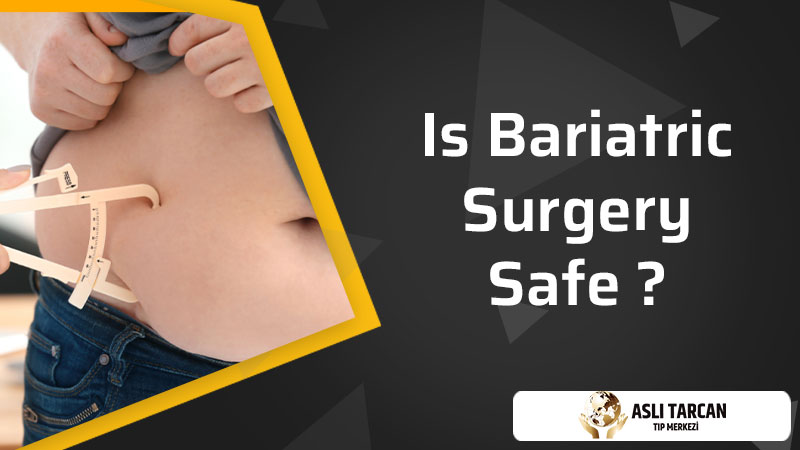Is Bariatric Surgery Safe Many recent clinical investigations have found that metabolic and bariatric surgery safety has improved significantly. Is bariatric surgery safe? Overall, bariatric surgery has a 0.1 percent mortality rate. Gallbladder surgery (0.7%) and hip replacement (0.93%) are less common procedures. The following are some of the most important reasons for increased security:
Laparoscopy is being use more frequently (almost all bariatric procedures are performing laparoscopically). Is bariatric surgery safe? Technological advancements in surgery. Metabolic and bariatric surgery have been shown in studies to extend life. When comparing to those who maintain a healthy weight, persons with oral obesity, or a BMI (body mass index) more than or equal to 30, have a 50 to 100 percent increased risk of premature death. Is bariatric surgery safe? Gastric bypass patients have been shown in studies to be able to:
Longevity is increasing by 89 percent. Reduces the risk of dying prematurely by 30 to 40%. The dangers of morbid obesity exceed the risks of metabolic and bariatric surgery in the long run.
What Is The Difference Between Bariatric Surgery And Weight Loss Surgery?
Obesity is a medical disease that necessitates treatment in order to avoid long-term health complications. Bariatric surgery, often known as weight loss surgery, is a procedure that allows a person to lose a large amount of weight. Bariatric surgery is performing using a variety of procedures. The surgeon makes your stomach smaller and reattaches the food, bypassing the part of the small intestine, in Roux-en-Y gastric bypass surgery. The surgeon eliminates roughly 75-80 percent of the stomach during sleeve gastrectomy surgery, resulting in a smaller stomach.
Is Bariatric Surgery Safe
Bariatric surgery (also known as Weight Loss Surgery or Obesity Surgery) has been proven to be the most effective approach for long-term weight loss. Many major health conditions, such as diabetes, hypertension, and obstructive sleep apnea, can be reducing or even eliminating with extreme weight loss, according to studies. Is bariatric surgery safe? Bariatric surgery may be the best option for you if you’ve tried and failed to reduce weight in the past and are in the “obese” weight category.
If You Meet The Following Conditions, You Should Consider Bariatric Surgery:
- Having a Body Mass Index (BMI) of greater than 40,
- If your BMI is greater than 35, and you suffer from one of the following health conditions as a result of obesity:
- High blood pressure (high blood pressure)
- Hyperlipidemia (high lipid (fat) levels in the blood)
- Diabetes • Sleep apnea • Severe joint pain
- Heart disease • Non-alcoholic fatty liver disease
- Failure to maintain a healthy weight after attempting to lose weight for a length of time.
Other therapies, such as the Weight Loss Program, are indicating if weight loss surgery is not ideal for you.
What Should I Expect Following Bariatric Surgery?
The great majority of patients only stay in the hospital for one or two nights after surgery. Because bariatric surgeries are perform through small incisions, most patients experience minimal pain after discharge, and you will only need to take pain medicine at home for a short period of time. After surgery, most patients are able to return to work in two to four weeks.
Your specialist will provide you detailed instructions on how to care for yourself throughout your recuperation, including what to eat, in collaboration with your primary care physician. You will only be able to handle tiny amounts of soft food and beverages for the first month. You will gradually be able to incorporate solid foods into your diet. Likewise, you will notice that you are traveling more quickly. In the first year after surgery, patients are typically seen every three months, then once a year after that.
What Are The Most Well-Known Bariatric Surgery Side Effects And Risks?
Let’s take a look at the hazards before moving on to the safety of bariatric surgery.
As with any surgical procedure, there are inherent dangers associating with bariatric applications. The following are the short-term general risks associating with surgeries conducting within the scope of bariatric surgery:
- esophageal enlargement acid reflux nausea and vomiting
- Gaining weight or being unable to decrease weight
- Complications that may arise following surgery; the kind and severity of these complications may vary from person to person. Furthermore, it is impossible to conclude that the hazards we have discussed are prevalent, that they will arise as a natural result of the procedure, and that they will affect everyone who has had the procedure. As a result, it’s important to avoid being biasing when reviewing bariatric practices.
Furthermore, your doctor will advise you about the hazards based on your health status and provide a treatment plan accordingly.
Every Surgical Procedure Has Its Own Set Of Dangers
Surgical procedures, by their very nature, carry a variety of hazards. Is bariatric surgery safe? So much so that there isn’t a single surgical procedure that we can’t discuss at a low or moderate level. When it comes to bariatric surgery, this is something that should not be overlooking.
Not only in surgical procedures, but also in natural weight loss methods such as diet and athletics, there is a chance of regaining lost weight. People who continue to have bad eating habits after surgery are also at danger of acquiring weight. This is not a result of the surgery, but rather a result of the patient’s mentality. Aside from these, there is no procedure that can be utilizing to change the body to this degree that is completely safe and without risk. This sort of obesity treatment, in which huge quantities of weight are lost, and a dramatic change is desiring, cannot be expecting to be fully risk-free.
When assessing the safety of bariatric surgery, it’s important to remember that being overweight involves a slew of health hazards. Obesity is linking to a variety of life-threatening conditions, including type 2 diabetes. Obesity causes diseases such as high blood pressure, high cholesterol, atherosclerosis and vascular occlusion, cancers such as bowel cancer and breast cancer, and numerous cardiac ailments. Thus, obesity, which causes both physical and mental sadness, carries dangers that are larger than those posed by bariatric surgery. When assessing the operations include in bariatric surgery as well as the benefits of these procedures, this fact should not be overlooking.
Is Bariatric Surgery Safe in Terms of Not Leading to Complications?
Bariatric surgery has become increasingly popular in recent years as a way for obese individuals to lose weight and improve their overall health. To simplify “what is bariatric surgery?” the procedure involves reducing the size of the stomach to reduce food intake, as well as bypassing some of the digestive systems to reduce nutrient absorption. You may wonder “is bariatric surgery safe?” While bariatric surgery is generally considered safe, there is still a risk of complications that can arise. The most common complication associated with bariatric surgery is an infection, which can be caused by bacteria in the stomach or intestine entering the surgical area. Infection can lead to abdominal pain, fever, nausea, and vomiting. In rare cases, severe infections can lead to sepsis or organ failure. To help reduce the risk of infection, patients should follow their surgeon’s instructions for post-operative care, including taking all prescribed medications and attending follow-up appointments. In addition to infection, there is a risk of internal bleeding during or after the procedure. This can be caused by trauma to the blood vessels during the operation or by a weakened clotting system due to nutritional deficiencies that may be present before surgery. These are the common risks associated with the question “is bariatric surgery safe?”




